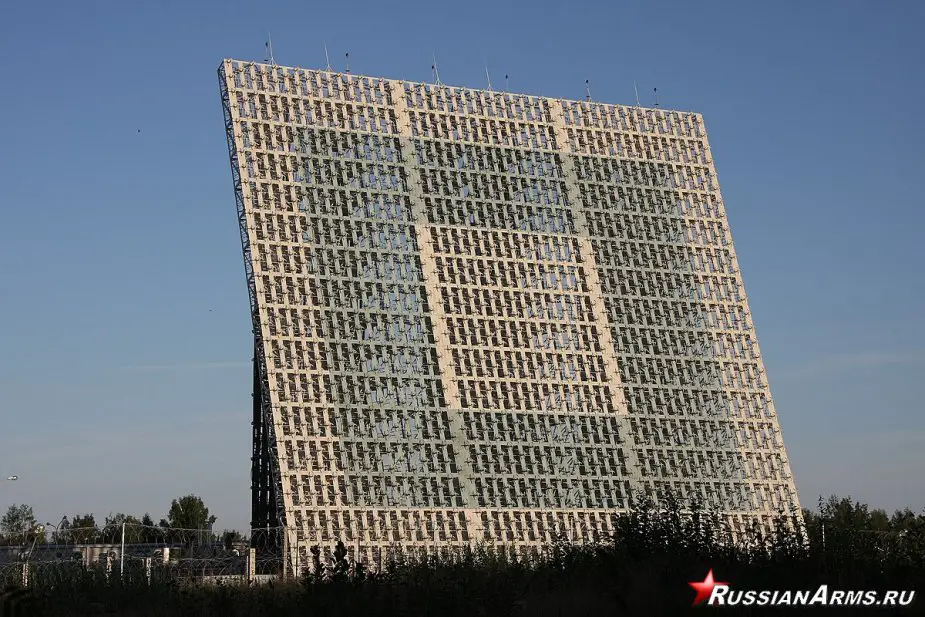Breaking news
Russia to build Arctic early warning stations by 2022.
Russia will build missile attack early warning stations in the Extreme North by 2022. Another station will be erected in Sevastopol in 2024. President Vladimir Putin said only Russia and the United States possess such stations at present, Gazeta.ru online publication writes.

Voronezh-M early warning radar in Lekhtusi (Picture source: RussianArms.ru)
Two new early warning stations will become operational in Komi and Murmansk region in 2022. The Defense Ministry said new radars are being designed. Defense Minister Sergey Shoigu earlier said the construction of facilities for the strategic nuclear forces in Crimea and the Arctic was a priority in military infrastructure development.
Military infrastructure is actively developed in Crimea. The construction of a new Voronezh-M early warning radar is to begin in Sevastopol this year and will be completed in 2024. The latest Voronezh radars are on constant duty to provide information on foreign launches of ballistic missiles. They are located by the perimeter of the Russian border in Leningrad, Kaliningrad, Irkutsk, Orenburg, Krasnodar, Krasnoyarsk, and Altai regions.
Voronezh radars are the current generation of Russian early-warning radar, providing long-distance monitoring of airspace against ballistic missile attack and aircraft monitoring. The first radar, in Lekhtusi near St Petersburg, became operational in 2009. There is a plan to replace older radars with the Voronezh by 2020. Their common name follows the pattern of Soviet radars in being named after a river, the Voronezh. The previous generation of radar was known as the Daryal (after Darial Gorge), Volga (after Volga River) and Daugava (Daugava River) and the generation before the Dnepr (Dnieper River), and Dnestr (Dniester River). The Voronezh radars are described as highly prefabricated meaning that they have a setup time of months rather than years and need less personnel than previous generations. They are also modular so that a radar can be brought into (partial) operation whilst being incomplete.
Russia has used the launch of these new radars to raise its concerns about US missile defence in Europe. At the launch of the Kaliningrad radar in November 2011 Russian President Dmitry Medvedev was quoted as saying "I expect that this step [the launch of the radar] will be seen by our partners as the first signal of our country's readiness to make an adequate response to the threats which the missile shield poses for our strategic nuclear forces."
Deputy Commander of Space Forces Major-General Igor Morozov said in February 2019 that Russia had completed the upgrade of the ground segment of early warning stations. "The national and the Defense Ministry leaderships have paid most attention to the strategic system of late. We have actually completed its modernization," he said. In 2018, three new radars went on combat duty in Yeniseisk, Barnaul, and Omsk.
Thus, Russia created a total radar field and eliminated gaps in it which appeared after the Soviet collapse, as some facilities remained on the territory of newly independent states. "The leadership of the countries eliminated some facilities and we had to rebuild the system anew," Morozov said. It remains to replace some outdated radars in a number of stations. It will take close to three years. The general said the upgrade of mathematical algorithms to process information will be constantly ongoing. The system is vital, as the United States withdrew from the Intermediate-Range Nuclear Force Treaty on August 2.
Morozov said the Russian space control system can monitor flights to the Moon and Mars and constantly controls the orbits up to 40 thousand km high. "All information arrives to the main space control center which keeps a catalogue of space objects. At present, it registers close to 20 thousand various spacecraft," he said.
Putin said Russia is assisting China in the creation of an early warning system. "I am not disclosing a major secret, as it will be known anyway. We are assisting the Chinese partners in the creation of a missile attack early warning system. It will radically improve the defense capability of China," he said. The president stressed that Moscow would continue cooperation with Beijing in military hardware, Gazeta.ru said.




























